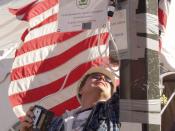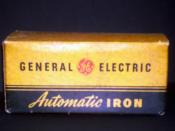When 60 Minutes' correspondent Lesley Stahl asked about G.E. polluting the Hudson River, G.E.'s chairman, Dr. Welch insisted, "We didn't dump. We had a permit from the U.S. Government and the State of New York to do exactly what we did. Do you think I'd come to work in a company that would do that, or condone that? I wouldn't do it, Lesley! This is nuts!" Well, it turns out that maybe it wasn't so nuts after all for G.E.'s critics to use the 'D' word, and maybe Dr. Welch would work in a company that would do just exactly that - dump (Heller, 2000). In any corporation, the individual members of the corporate board of directors bear ultimate ethical and moral responsibility for a company's decisions and corporate actions. In this case, the individual members of G.E.'s corporate board bear primary and ultimate responsibility for the Company's manner in delaying and avoiding clean up of the firm's PCB mess in the Hudson River.
What once was an amber manufacturing oil, is now an invisible plague on New York's signature waterway, and the debate about how best to clean it up continues to rage more than two decades after it began.
Increasingly, potentially responsible parties are becoming advocates of a view that natural recovery or processes that reduce the need for costly cleanup of contaminated sediments. On the other hand, in three separate reviews both the State Department of Environmental conservation (DEC) and the Environmental Protection Agency (EPA) have indicated that dredging would provide substantial environmental benefits with either few or relatively minor adverse impacts (Heller, 2000). Compared to natural recovery, dredging buried PCBs from the Hudson River bottom would be a significantly faster and more efficient way to reduce sediment PCB levels.
PCB contamination is considered the most serious...



Great Paper
I live in Upstate NY right on the river and your essay couldn't be more accurate. Great information and hard facts. Great job. Great college paper!
7 out of 7 people found this comment useful.